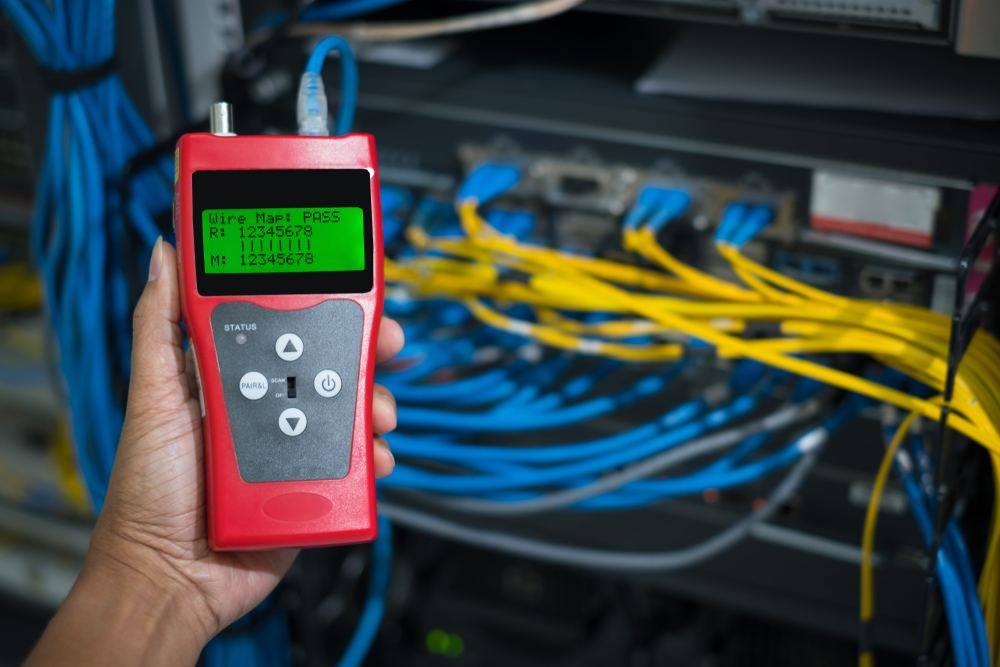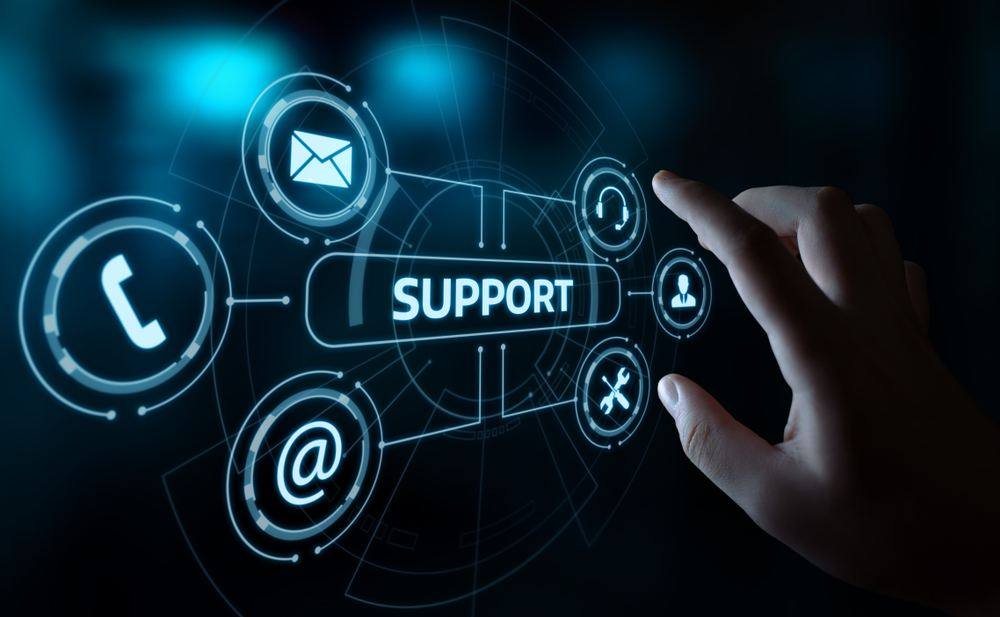VoIP Systems: Great Call But Potentially Dangerous

Voice over Internet Protocol (VoIP) phone systems are integral to modern business communications. But, as with most IT equipment, VoIP systems require regular updates and testing to perform at their best.
That’s not to say you shouldn’t adopt a VoIP system. In two years’ time, you won’t have any other option anyway. The UK is upgrading its outdated analogue telephony infrastructure (PSTN) in favour of digital landlines.
But that’s good news. Before IP telephony emerged, telecommunication systems required more maintenance and call costs were more expensive. That’s not to say that VoIP systems don’t require any maintenance. They do. But the infrastructure needed to deploy VoIP delivers more benefits than the old networks.
Thanks to advanced features, cost-effective calling and scalability, VoIP telephony systems have revolutionised business communications.
What are the Benefits of VoIP Systems?
If you haven’t already switched to VoIP, there are several reasons why you should consider adopting the technology asap.
Cost savings
VoIP systems can significantly reduce the cost of business communication. This can lead to lower phone bills and reduced infrastructure costs.
Flexibility
VoIP systems offer greater flexibility and scalability than traditional phone systems, as they can be easily configured to accommodate changes in business size and requirements. This makes it easy to add or remove lines, change features, and scale up or down as needed.
Mobility
With VoIP, employees can make and receive calls from anywhere with an internet connection, using their office number. This makes it easier to work remotely and stay connected with customers and colleagues.
Integration
VoIP systems can integrate with other business tools, such as customer relationship management (CRM) software, to provide a more unified and streamlined communication experience.
Advanced features
VoIP systems offer a range of advanced features, such as call forwarding, voicemail-to-email, and video conferencing, which can improve productivity and collaboration within the business.
However, VoIP is not all diamonds and roses. As with most digital infrastructure, they can be high maintenance. Because VoIP systems require a high-speed internet connection, poor signal strength causes server latency. Network faults will also disrupt operations. High availability can become an issue.
Digital systems will also pose businesses with other threats — which could put you out of business. Maintaining these systems is, therefore, critical for protecting your business continuity.
The Critical Role of VoIP System Updates
An understanding of VoIP systems, broadband connections and cloud solutions is critical for maintaining the performance of digital landlines. Monitoring and updates are also required because:
Hackers are a threat
VoIP system updates often require security patches and updates that address known security vulnerabilities in the system. Failing to update your VoIP system can leave it vulnerable to cyber-attacks and other security threats.
The threat of a data breach has a knock-on effect on compliance. VoIP system updates can help to ensure that your system remains compliant with relevant regulations and standards, such as the General Data Protection Regulation (GDPR) or the Payment Card Industry Data Security Standard (PCI DSS).
Consider compatibility
Digital software does not always play nice. Whilst VoIP system updates are designed to keep your system compatible with other software and hardware components on your network, issues can arise.
Future-proofing
Future-proofing your system ensures that your lines of communication remain relevant and useful in the years to come. VoIP systems updates also ensure you leverage the latest innovations.
Updates can introduce new technologies and features that can help your business stay competitive and agile in a rapidly changing marketplace. We have already seen that the goal of the digital revolution is rapid evolution.
It is inevitable that VoIP systems will need regular updates and testing to stay ahead of the curve. Business IT support services play a vital role in ensuring the proper maintenance protocols are carried out.
We also recommend allocating resources for training employees to use VoIP systems efficiently, but also to identify suspicious activity that VoIP exposes you to. VoIP is an open channel for hackers to drop malicious links and infected files.
The Future of VoIP and System Maintenance
There is no doubt that VoIP system maintenance will become increasingly complex moving forward. The only solution we can see is automated monitoring and predictive maintenance. It will be much quicker, save time and be less expensive than existing maintenance practices.

As VoIP technology continues to evolve, we expect the technology will need to integrate with other digital communication tools; AI and machine learning jump out for starters.
AI and ML can be used to improve call quality, automate tasks such as call routing and transcription, and provide advanced analytics and insights into call data.
One trend that is already taking shape is the move towards cloud-based solutions. Cloud-based VoIP systems offer greater flexibility, scalability, and cost-effectiveness than traditional on-premises systems, as they are hosted remotely and accessed over the internet.
It’s easier for businesses to scale up or down on the cloud. Plus you can access advanced features and functionality in a few clicks without needing to install expensive hardware or software.
In terms of system maintenance, the future of VoIP is likely to see a greater emphasis on proactive monitoring and support. As businesses become increasingly reliant on VoIP for their communication needs, it will be important to ensure that systems are up-to-date, secure, and operating at peak performance.
Routine VoIP System Testing
When VoIP phone systems go awry — which can happen after an update — businesses that rely on telephony communications for sales potentially risk a significant revenue loss.
Routine testing of a VoIP system is essential. This ensures the system is operating efficiently, phone trees and phone numbers are functional and the network is secure.
To perform routine testing:
Identify and Fix Issues
Regular testing can help identify and fix any issues with the VoIP system before they become a problem. This can help to minimise downtime, reduce the risk of data loss or security breaches, and prevent costly repairs.
Ensure Quality of Service
Testing can help ensure that the VoIP system is delivering high-quality voice and data communications, with clear call quality, minimal latency, and reliable connections. This is especially important for businesses that rely on VoIP for their day-to-day operations.
Validate Security
Validating the security of the VoIP system cannot be overlooked. It’s critically important to protect your business network against unauthorised access, hacking, and other forms of cyber threats.
This is particularly important for businesses that handle sensitive information or operate in regulated industries, where data security is a top priority. Regulatory requirements, such as data retention and privacy laws can invite legal and financial penalties for non-compliance.
Protect Scalability
As your business grows, VoIP systems help you to scale quickly. They are also able to handle increased traffic. Routine testing can help to future-proof the system and ensure that it continues to meet the needs of the business in the long term.
Best Practices for VoIP System Maintenance
As I’ve outlined above, maintaining a VoIP system is essential to ensure that it continues to operate smoothly, efficiently and securely. The most sensible solution is to establish best practices for VoIP system maintenance.
Best practices for VoIP maintenance help to minimise downtime, improve the user experience, and protect critical business data. Here’s how to get started.
Monitor System Performance
Leverage monitoring tools to track your VoIP performance. Cloud-based remote monitoring tools can identify potential issues and gives your IT team a heads-up to address any issues before they escalate into larger problems.
Regular Testing
I know I mentioned regular testing above, but it is worth reiterating and should be a critical feature of your best practices for maintaining VoIP systems.
Regularly testing your VoIP system ensures that it is functioning as you need it to. The type of tests you should run include testing call quality, call routing, latency, features, and connectivity, as well as testing the security measures and data backup. I also recommend creating recovery processes for each of the testing protocols.
Security Measures
Implementing security measures, such as firewalls, antivirus software, and intrusion detection systems should be standard procedures to guard against hackers breaching your business network through your VoIP system. Regularly review security logs and audit trails to identify potential security issues.
Backup and Recovery
Performing regular backups for your VoIP system data ensures that data can be restored in the event of a system failure, power outage or natural disaster. A cloud-based backup and recovery process helps to minimise downtime and prevent the loss of critical business data.
Quality of Service (QoS)
Monitoring QoS metrics, such as jitter, packet loss, and latency, helps the VoIP system to deliver high-quality voice and data communications. Address any issues that are impacting the QoS to improve the user experience.
Collaborate with a Trusted Service Provider
Partner with a reliable VoIP service provider to ensure you have access to support administrators that can assist in maintaining your system and troubleshooting issues you are having difficulty fixing.
It’s also a good idea to establish a schedule for your service provider to perform routine updates. We can perform updates during off-peak hours to minimise disruptions.
Keeping the VoIP system up-to-date with the latest software updates and security patches helps to protect your business network and leverage the latest features.
Updates can often contain bug fixes and security enhancements that can improve the system’s performance and protect it from security vulnerabilities.
Staff Training
Finally, providing training to staff enables them to leverage the tools VoIPs offer. Staff training help to minimise user errors, improve system security, and increase overall system efficiency.
VoIP Business IT Specialists in London
VoIP phone systems are integral to business operations, productivity and profitability. Adhering to best practices and working closely with a trusted service provider such as business IT specialists in London, means you will enjoy the many benefits VoIP systems offer.

The IT specialists at Micro Pro help you to maintain the efficient running of your VoIP system without risking costly downtime or security breaches.
Managed IT specialists play a critical role in maintaining your VoIP system by providing ongoing support, monitoring, and maintenance.
When looking for outsourced IT specialists in London, it’s important to consider the experience, expertise, and reputation of the company. You should also consider their pricing, service level agreements, and customer support options to ensure that they can meet your specific needs.
Our IT specialists monitor the health of your VoIP system 24/7, looking for potential issues that could impact performance or lead to downtime. We set up alerts and notifications to proactively address emerging faults.
If an issue does arise with your VoIP system, our business IT specialists provide support to help you troubleshoot and resolve the issue quickly. We can usually fix problems from our remote support desk, but if necessary, we will dispatch an engineer to the site where the error has occurred.
We also offer patch management services to ensure that your VoIP system software is up-to-date with the latest security patches and software updates. This reduces the risk of security vulnerabilities and facilitates optimal system performance.
In addition, we have a few tricks and tweaks that help to optimise the performance, ensuring that your calls have the highest possible quality of service. They can adjust settings and configurations to minimise latency and packet loss, improving call clarity and reducing dropped calls.
If required, we can also send an IT specialist to your offices to provide staff training to make sure you get the most out of your VoIP system. This can include training on how to use the system effectively, troubleshooting common issues, and best practices for maintaining the system.
If you want ongoing support and maintenance for your VoIP system, our IT specialists in London ensure that your telephony communications consistently operate efficiently and reliably.
For more information about our VoIP services and other business support services, contact a member of our knowledgeable team.


